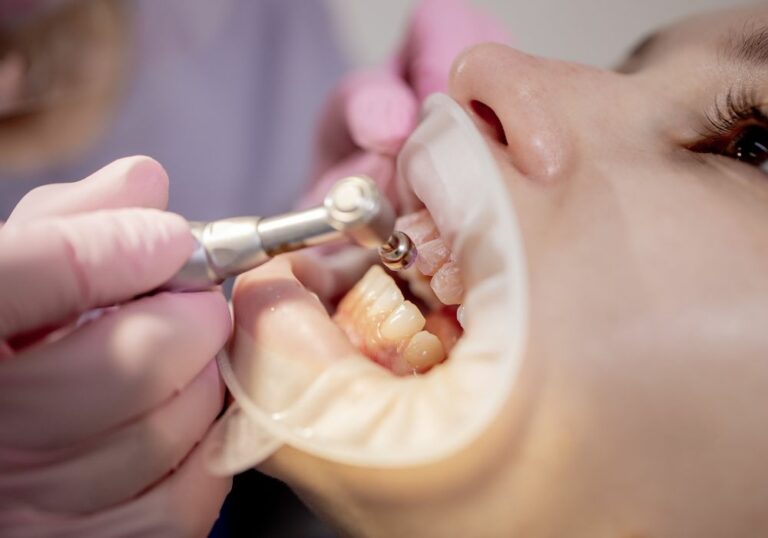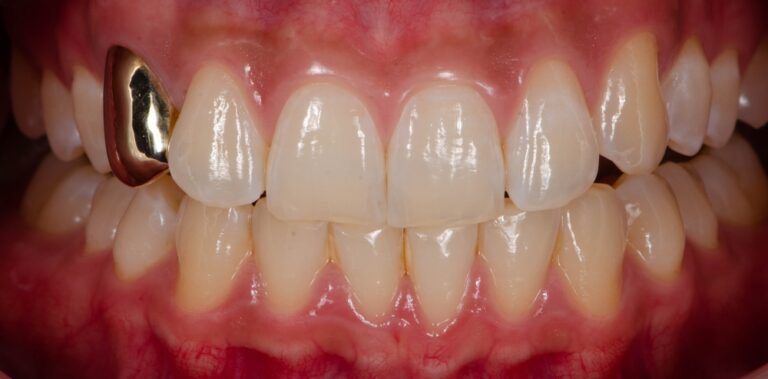What causes gum pain that seems to radiate to your tooth?
Gum pain that seems to radiate to your tooth is most commonly caused by gum inflammation known as gingivitis. Gingivitis occurs when plaque, a sticky film of bacteria, builds up on your teeth. Plaque that is not removed by brushing and flossing hardens into tartar that irritates your gums. This can cause red, swollen gums that may bleed easily when you brush or floss.
As gingivitis progresses, your gums can pull away from your teeth, forming pockets that become infected. This more advanced form of gum disease is called periodontitis. The bacteria in plaque release toxins that cause inflammation and damage to gum tissue and the bones that support your teeth. As the gums pull away from the teeth, the teeth may loosen or fall out.
With gum inflammation, you may feel pain that seems to be coming from the tooth, but is actually radiating from the irritated gum tissue around the tooth. The toxins released by plaque bacteria stimulate pain receptors in the gums that make your gums hurt. As your body reacts to this irritation and inflammation, blood rushes to the area, making the gums red, sore and swollen. This increased blood flow and fluid buildup in the gums presses on the teeth, which can make it feel like the pain is originating from the tooth itself.
The gum tissue is interconnected with the nerves that service the teeth, so inflammation and irritation in the gums can cause confused pain signals that the brain perceives as coming from the tooth. Nerves run from the gum tissue into the dental pulp inside the tooth. When the nerve endings in the gums get irritated, the brain thinks the pain is coming from the nerve endings inside the tooth pulp. This referred pain phenomenon explains why gum inflammation surrounding a tooth can make that particular tooth hurt.
What are other causes of gum pain around the teeth?

Here are some other potential causes of gum pain around the teeth:
- Gingivitis or periodontitis: As described above, bacterial plaque accumulation causes progressive gum inflammation and damage that can lead to pain and discomfort. If left untreated, plaque can harden into tartar that accumulates both above and below the gumline. Buildup below the gums is especially problematic, as it causes inflammation and infection in the gum pockets surrounding the teeth.
- Injury: Trauma to the gums from biting the cheek, eating hard or crunchy foods like nuts or hard candy, brushing too aggressively, or oral surgery can damage gum tissue and cause soreness. Any laceration, cut or tissue damage makes gums prone to irritation.
- Sensitivity: Gums may be sensitive to hot, cold, acidic or sugary foods. Exposure of the tooth roots due to receding gums increases sensitivity. Some toothpastes for sensitive teeth can help reduce gum sensitivity as well as tooth sensitivity by containing compounds like strontium chloride or potassium nitrate to numb nerve pathways.
- Mouth sores: Canker sores, oral lichen planus or other mouth lesions can develop on the gums and be irritated when eating, brushing or flossing. The abrasion makes them more painful. These should resolve within 1-2 weeks with proper oral care.
- Infection: Serious gum infections like acute necrotizing ulcerative gingivitis (ANUG) can cause gum pain, swelling, bleeding, bad breath and other symptoms. Also known as “trench mouth”, ANUG is an inflammatory infection requiring antibiotics and proper oral hygiene to resolve.
- Ill-fitting crowns or fillings: Dental restorations not properly shaped and fitted can impinge on gum tissue and cause irritation, especially if the margin goes below the gumline. Immediately inform your dentist if a crown or filling is hurting your gums.
- Dry mouth: Lack of adequate saliva production can make the gums more easily irritated and prone to inflammation. Drinking water, avoiding diuretics, and using saliva substitutes or medications that increase saliva can help.
- Vitamin deficiencies: Low levels of vitamins C and B12 have been associated with gum problems like swelling, redness, bleeding and tenderness. Supplements may help, but check with your doctor first.
- Oral cancer: Persistent mouth pain including gum pain can sometimes be a sign of oral cancer, especially if combined with loose teeth, numbness or sores that don’t heal. White, red or dark patches in the mouth also warrant investigation. See a dentist promptly.
- Pregnancy: Hormonal changes during pregnancy can increase sensitivity and lead to swollen gums that bleed easily. Excellent oral hygiene and more frequent dental cleanings help control “pregnancy gingivitis”.
Why does gum disease cause pain in nearby teeth?
Gum disease can cause pain that seems to radiate from teeth for the following reasons:
- Inflamed gum tissue – When gums are inflamed in gingivitis or periodontitis, the swollen, irritated gum tissue pressing on teeth can cause pain. Increased fluid in the tissue puts pressure on nerves in the teeth.
- Deep gum pockets – When diseased gums pull away from teeth they form deep pockets around the teeth that trap bacteria and become infected. This infection right next to the tooth can cause pain.
- Exposed roots – Receding gums expose sensitive tooth roots usually protected by gum tissue, causing pain from hot/cold foods or air. The thinner layer of root surface is more easily stimulated.
- Loose teeth – Teeth loosened by damage to gum and bone can shift or move during chewing, causing pain. Mobile teeth also allow easier bacterial invasion of the tooth’s inner pulp.
- Toxins – Bacterial toxins from plaque irritate nerves in gums and prompt inflammation that makes gums hurt. Pain seems to come from the tooth.
- Referred pain – Like chest pain from the heart, gum pain is often “referred” to other areas like the teeth because nerves are interconnected. The brain misinterprets its origin.
So in summary, unhealthy gums riddled with bacterial plaque allow inflammation, infections and toxins right next to teeth. This causes pain in gum tissue that seems to radiate from neighboring teeth. Treating gum disease reduces this discomfort.
What is the best way to stop gum pain referred to your tooth?

The most effective way to stop gum pain that seems to radiate from a tooth is to treat and control the underlying gum inflammation and infection causing the problem. Here are some tips:
- Improve oral hygiene – Brush thoroughly twice daily and floss once daily to control bacterial plaque buildup and hardening into tartar. Scrub along the gumline but avoid excessive pressure. Use antiseptic mouthwashes as part of your routine.
- Professional cleaning – Get a dental cleaning and periodontal exam every 6 months to remove tartar below gumlines that causes gum irritation. Regular cleanings let the hygienist monitor gum health.
- Treat gum infections – For more severe gum infections, antibiotics like doxycycline or metronidazole may be prescribed to fight bacteria for 7-10 days along with antimicrobial rinses. Finish all pills even if gums look better.
- Have irritated gum tissue smoothed – If swollen gums are impinging on teeth, a dentist can reshape and smooth the gumlines by removing excess tissue for a more comfortable fit using scaling and root planing.
- Take analgesics – Over-the-counter pain relievers like ibuprofen (Advil) or acetaminophen (Tylenol) can temporarily relieve discomfort from sore gums. Use as directed.
- Rinse with warm salt water – Rinsing a few times a day with warm salt water helps reduce gum inflammation. Dissolve 1 tsp salt in a cup of warm water and swish carefully.
- Use topical numbing gels – Products like Orajel or Anbesol applied directly to the gums can temporarily numb and soothe sore inflamed gum tissue to provide relief.
- Get loose teeth secured – Splinting or bonding teeth weakened by gum loss limits painful shifting while chewing. This stabilizes teeth and allows inflamed tissue to heal.
- Quit smoking – Smoking increases gum problems and interferes with healing. Quitting improves gum health. Nicotine constricts blood vessels, impairing tissue repair.
- Manage health conditions – Control diabetes, hormonal changes, stress and other diseases that increase risks of gum inflammation and infection. Get frequent dental cleanings.
The sooner gum disease is brought under control through good oral hygiene and professional treatment, the sooner gum pain and referred tooth pain will resolve. Be sure to see a dentist regularly to maintain healthy gums.
When is gum pain concerning enough to see a dentist right away?

While mild gum irritation can be treated with at-home measures, certain circumstances should prompt an immediate dental visit. Seek urgent care for gum pain if you have:
- Bleeding – Profuse gum bleeding not stopped by 10-15 minutes of firm pressure suggests a serious dental issue needing professional treatment. Bleeding from multiple areas is worse.
- Swelling – Quickly spreading gum swelling could indicate a dental abscess where infection is worsening and spreading. Facial swelling, even mildly, needs rapid care.
- Loose teeth – Sudden tooth looseness not due to an obvious injury could mean advanced gum disease requiring prompt attention to save teeth. This is an emergency.
- Gum sores – Painful mouth sores that do not heal within 2 weeks need evaluation to rule out cancer risks. White, red or dark patches also warrant prompt investigation.
- Receding gums – Rapid gum recession around multiple teeth may indicate aggressive gum disease. This can lead to loose teeth if not treated quickly.
- Tooth sensitivity – New tooth sensitivity to hot or cold temperatures may be due to gum loss exposing sensitive roots. This needs treatment before it worsens.
- Bad breath/taste – A bad taste in the mouth or foul breath can be a sign of infected gums that could progress without antibiotic treatment.
- Fever – Gum infections may cause a fever requiring prescription antibiotics and drainage if an abscess is present. Fever indicates infection spreading.
- Difficulty swallowing/speaking – Gum abscesses can make it hard to swallow or talk normally. Infection may be pressing on nerves affecting function.
- Chronic pain – If gum pain persists for more than 1-2 weeks or keeps returning, see your dentist to determine the cause and appropriate treatment.
Pain is your body’s way of signaling it needs help. While you can manage minor gum discomfort at home initially, worsening or severe pain demands an urgent visit. It’s better not to delay when it comes to gum problems, as they can rapidly worsen.
Frequently Asked Questions
What is the connection between gums and teeth?
Gums and teeth are closely interlinked in the mouth, almost functioning as one unit. Gums consist of firm yet flexible connective gum tissue that tightly surrounds and supports the teeth. Healthy gums attach snugly to teeth with no spaces between the gumline and the tooth. This tight seal or attachment helps hold teeth firmly in the jawbone via the periodontal ligament.
Gums provide a protective barrier for the tooth roots and inner pulp against bacteria and trauma. Healthy gums help insulate teeth from extremes of temperature that could irritate the inner nerves. Gums also grip teeth to securely anchor them for proper biting and chewing function.
Can my toothache be coming from my gums?
Yes, gum inflammation, infection and irritation can definitely cause pain that seems to be coming from a tooth itself, but is actually originating in the gum tissue around the tooth’s root. Unhealthy gums allow bacterial toxins and inflammation byproducts to penetrate towards the tooth’s inner pulp, which is highly sensitive. The nerve endings register this irritation and transmit pain signals that the brain perceives as coming from inside the tooth, even when the pulp is not directly inflamed.
Gum disease damages the attachment fibers that normally hold gums tight to teeth, allowing motion that can increase this perceived tooth pain from diseased gums. Since gum nerves and tooth pulp nerves are closely interconnected, inflammation in one area is often felt in the other.
Why do my gums hurt when I floss?
Sensitive, swollen gums that hurt when flossing are most often a sign of gingivitis, which is early stage gum disease. Healthy gums should not hurt when flossing. The fact that your gums bleed and are painful indicates inflammation and infection has already set in from a buildup of bacterial plaque and tartar below the gumline and between teeth.
Improved oral hygiene habits like gentle but thorough flossing as well as brushing twice daily are required to clear away the disease-causing plaque and promote healing. Over-the-counter antiseptic rinses can help reduce bacteria. See your dentist promptly as well for a professional cleaning and exam to get gum disease under control before it can damage tooth-supporting bone.
What does gum disease feel like?
In early stages of gingivitis, gum disease may have no obvious symptoms, or only mild symptoms like occasional bleeding when brushing or flossing. As gum inflammation and infection progresses to periodontitis, symptoms become more noticeable:
- Sore, painful gums
- Gums that look inflamed, swollen or pulled away from the teeth
- Persistent bad breath, even after brushing
- Painful chewing
- Teeth that look longer due to receding gums
- Pus between teeth and gums
- Loose teeth
- Changed bite alignment
See your dentist immediately if exhibiting any of these advanced gum disease symptoms, as irreversible bone and tooth loss may occur without rapid treatment. Bleeding gums or gums that hurt with flossing signals the disease is already underway, so don’t delay.
When should I see a dentist about gum pain?
You should consult your dentist promptly about gum pain that arises and persists longer than 1-2 weeks, or gum pain that seems to be worsening rather than improving. Also see your dentist right away if gum pain is severe, interferes with eating/talking, or is accompanied by bleeding gums, swollen gums, receding gums, loose teeth, sores or bad breath.
These symptoms could indicate a serious gum infection like ANUG, or an abscess that needs antibiotic treatment and drainage. Catching gum disease early is key, as advanced stages can rapidly destroy the bones anchoring teeth. Don’t wait with gum pain – a dentist can determine the cause and recommend the appropriate treatment.






